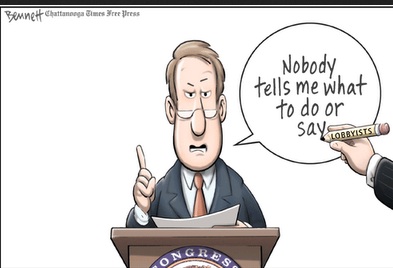Pro Publica reports on the campaign contributions and lobbying efforts of businesses and organizations targets by States’ Attorneys General.
Attorneys general are now the object of aggressive pursuit by lobbyists and lawyers who use campaign contributions, personal appeals at lavish corporate-sponsored conferences and other means to push them to drop investigations, change policies, negotiate favorable settlements or pressure federal regulators, an investigation by The New York Times has found.
A robust industry of lobbyists and lawyers has blossomed as attorneys general have joined to conduct multistate investigations and pushed into areas as diverse as securities fraud and Internet crimes.
But unlike the lobbying rules covering other elected officials, there are few revolving-door restrictions or disclosure requirements governing state attorneys general, who serve as “the people’s lawyers” by protecting consumers and individual citizens.
A result is that the routine lobbying and deal-making occur largely out of view. But the extent of the cause and effect is laid bare in The Times’s review of more than 6,000 emails obtained through open records laws in more than two dozen states, interviews with dozens of participants in cases and attendance at several conferences where corporate representatives had easy access to attorneys general.
Often, the corporate representative is a former colleague. Four months after leaving office as chief deputy attorney general in Washington State, Brian T. Moran wrote to his replacement on behalf of a client, T-Mobile, which was pressing federal officials to prevent competitors from grabbing too much of the available wireless spectrum.
“As promised when we met the A.G. last week, I am attaching a draft letter for Bob to consider circulating to the other states,” he wrote late last year, referring to the attorney general, Bob Ferguson.
A short while later, Mr. Moran wrote again to his replacement, David Horn. “Dave: Anything you can tell me about that letter?” he said.
“Working on it sir,” came the answer. “Stay tuned.” By January, the letter was issued by the attorney general largely as drafted by the industry lawyers.
The exchange was not unusual. Emails obtained from more than 20 states reveal a level of lobbying by representatives of private interests that had been more typical with lawmakers than with attorneys general.
“The current and increasing level of the lobbying of attorneys general creates, at the minimum, the appearance of undue influence, and is therefore unseemly,” said James E. Tierney, a former attorney general of Maine, who now runs a program at Columbia University that studies state attorneys general. “It is undermining the credibility of the office of attorney general.”

